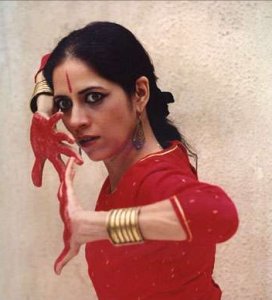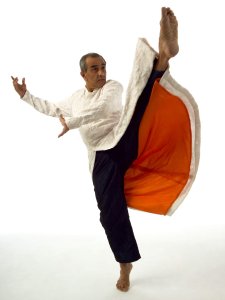
|
 |

|
 |
The Diary of an Argumentative India - Ramu Ramanathan, Mumbai e-mail: rramu@bom3.vsnl.net.in October 16, 2007 (This article appeared in the Hindustan Times, dated October 2, 2007) What is the relationship between a man of principle and a man of opportunism? And how much should one concentrate on humans' cultural values? These are questions which keep confounding us. While driving though the super-affluent district in South Gujarat, with its cash crops, manicured roads, and construction activity, I get an opportunity to review the situation a few months prior to the biggest (and most emotional) assembly elections in "the Hindutva Laboratory." - Contemporary dancer and resident of Navsari, Astad Deboo gets a Padmashree Award. So far more than 2000 Indians have received the Padmashree, the 4th most important Government award. - Things are stirred up; when Astad Deboo rejects the Gujarat Sangeet Natak Akademi Award. The Padmashree winner sent an email declining the award. "I am unable to accept the award because I don't believe in the policies of the State Government (Gujarat) and its actions... Since the award is given by the Government, I cannot in good conscience accept it." - Everyone says, Waah Astad Waah! But a Gujarat Government official says, "This is a betrayal of trust." The official may be right. After all, Manhar Udhas and Parthiv Gohil (both Ghazal singers) have accepted the award "as an inspiration," and for "their service to Gujarat." 
Aditi Mangaldas Photo: John Panikar - Prior to Astad Deboo, Kathak exponent Aditi Mangaldas turned down an award conferred by the Gujarat Sangeet Natak Akademi. She said, "'I am unable to accept this award because I do not believe in the policies of the current government in Gujarat and its actions. Since the award is given by the state government, I cannot, accept it. Art is all encompassing and it obliterates all divisions. It removes our self-made, self-imposed barriers of caste, class, language and community." - 24 hours later, the Agricultural Produce Marketing Committee in Himmatnagar denied permission for the use of its performance space for a function which was to be inaugurated by Mangaldas. - In Ahmedabad, Chief Minister Narendra Modi felicitates NASA Astronaut and Indian-American, Sunita Williams. It's a master stroke. He nullifies Congress Party's celebrations with Williams which began at Sabarmati Ashram. Also by felicitating Williams, Modi patched up with the Pandyas. Since Haren Pandya's assassination in March 2003, his father, Vitthal Pandya has been holding Mr. Modi responsible for it. Six months later, Haren Pandya was assassinated. - At the felicitation for Williams hosted by Gujarat University, Mr. Modi states Sunita Williams is the Pride of Gujarat who can inspire its youth. He recalls how he had met Williams when the late Haren Pandya had introduced her to him. "It was 1975 or 1976 - the draconian Emergency had been clamped by the Congress Party and I was Underground. It was then that Haren Pandya had brought two little girls (his cousins) to meet me - one was Dina and another was Sunita," Mr. Modi stated. - We meet theatrewallahs in Gujarat. They speak about the anti Modi farmer's rally in Rajkot. This rally attracted more than 2.5 lakhs people, most of the natives originating from Kutch and Saurashtra - and belonging to two farmer communities, Patel and Koli who are considered in a position to change the elections statistics of the state. - A Mumbai TV producer tells me to relax. He says, more than the beleaguered Congress, the main opposition is emerging from BJP rebels who are corrupt and inefficient, according to the man whom his rivals call, 'Duryodhana.' This TV Producer who hails from the same home-town as Narendra Modi says, Mr Modi is pro-progress and pro-democracy; and unlike other politicians, he does not brook nepotism and favouritism. In fact even Godhra was an evil plan to belittle him, since Mr. Modi's saarthi (driver) is a Muslim. - The final finale is a tiny meeting Forum for Justice and Peace at St Pius College, Goregoan East. A handful of activists, lawyers and journalists are discussing the action plan about those guilty in the communal riots in Gujarat. The agenda is simple (and therefore impossible to achieve). To have a public hearing of the victims of the families. And try to get Justice for Riot Victims (something which has never occurred in post Independence India). Researchers will take-up case studies of the families of the riot victims. A format would be given to the researchers to procure information for a PIL. 
Astad Deboo Photo: Farrokh Chothia These then are some of the facts, as one understands them. As one attends meetings and closed door discussions, it is clear, as a nation state, we seemed to have lost the ability to pay heed to dissident voices, or critics of the Government. Our systems (the four pillars, as it were) have come to parrot a narrow selection of democratic ideas, usually in defense of orthodoxy or ultra conservatism. A few years ago, I had witnessed an Astad Deboo performance. He performed Muktibodh's LAKDI KA RAVANA. Stanzas from the poem were read-out. The Gundecha Brothers sang. Astad made a theatrical entry. This was post-Rajeev Gandhi. So, we had a lal-batti wallah official car. His back-stage team was converted into Black Cats with their AK-47s. He strutted with the customary fan-fare, one associates with a mantri. On stage, he oozed with self-importance and vanity, even as he methodically started disrobing an assortment of garments, which symbolised the tiers in our society. It was good stuff. Astad was considering the dominant ideology of our society and critiquing it by comparing it with the social reality of that very society (subordination of the individual and the social inequality). Later, I recall seeing one of Astad's quieter pieces. Ratan J Batliboi designed a box with open slots. Due to this, the whole was never visible. Just fragmented viewing. A wrist, an ankle, the chest. It was a constant shift between the seen and unseen. It was an attempt questioning distortions in your perspective of Human Freedom. Astad Deboo was saying, what you see is not necessarily what you get. 60 Years of Freedom The refusal of the awards by Aditi Mangaldas and Astad Deboo has stated, freedom and politics can never be separated. There are innumerable opinions on this. After all, the two Ghazal singers have accepted and Sunita Williams has spent quality time with Mr. Modi on the stage. So, who is right? Those who say, no? Those who say, yes? Or Mr. Modi? I recall, a similar line of thought emerging during a tete a tete with the noted film-maker, Istvan Szabo (MEPHISTO, TAKING SIDES) in Mumbai. When he was asked, about the nature of complicity in an artist. That is, what constitutes complicity? Is it one's responsibility always to act out against a corrupt regime, or to, in perhaps more subtle ways, to beat the system? Szabo replied, "You have to know your limit. That is, how far do you have to go? How far can you be pushed before you do something? Because if you ask the question, what is your moral responsibility? ... If you have any decision of this kind, I'd have to say that you have only one solution: leave the country immediately. But the whole population cannot leave the country. And then what about a very talented baker? Or a very talented teacher, or medical doctor? So, of course some prominent people can leave the country, but the whole population cannot. So, we have to ask the question: are they good enough and profound enough for everybody?" In the 60th Year of Freedom, are we asking these questions? Playwright-director Ramu Ramanathan has carved a niche for himself in contemporary Indian theatre. He is the editor of PT NOTES, a monthly theatre newsletter produced by Prithvi Theatre in Mumbai. He scripted 'Curfew,' 'The Travel Show' (a piece in mime and pantomime), and 'Combat' for Jaimini Pathak's company Working Title. He scripted and directed the highly acclaimed 'Mahadevbhai' that provides a peek into the events that shaped the nation. 'Collaborators,' about a mesmerizing journey into the tormented mind of four characters and the nation, bagged the BBC Radio Playwriting Regional Award (2003) and was also an invitee to Berlin Literary Festival 2004. His play 3 Sakina Manzil (a docu-drama about the 1944 Mumbai Dock Explosion) has been critically acclaimed all over the country and was selected for the Brussels Theatre Fest and the Frankfurt book fair. |